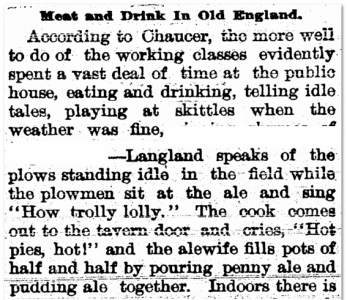

A man who manages an intestate estate.ĪDVOCATE One who pleads a case for another. Skilled in statistics, especially on the expectancy of life and the average proportion of losses by fire and other accidentsĪDMINISTRATOR (ADMINISTRATRIX - female) Someone who directed the affairs of another i.e. An officer or a mercantile or insurance company. In the ancient and medieval world, it was considered disgraceful for a woman to go on the stage -a belief that continued up until the 17th century.)ĪCTUARYĚn account keeper. (In the past, only men could become actors. the equipment of a solider other than arms and uniform.ĪCTORĚ theatrical performer. pregnancy, labour and the time after deliveryĪCCOUTREMENT MAKER or ACCOUTRER Someone who supplied dress or trappings equipment - i.e. A male physician skilled in the art and science of managing obstetrics.
#OLD WORD FOR TAVERN KEEPER PROFESSIONAL#
A person who supplied food provisions to various outletsĪCCOUCHEUR A professional obstetrician. It indicated a qualified sailor with service.ĪCATERĚ present day caterer. Also an Able Seaman was (and is) a naval rank for the lowest but one sailor rank, the lower rank being Ordinary Seaman or Seaman. We hope you find the updated information useful for your research.ĪBLE SEAMANĚn unlicensed member of the deck department of a merchant ship. PLEASE NOTE: This list has been checked and verified by ourselves (2012) and unlike some other websites that have a similar occupation list we have removed spurious occupations, added others and improved job description.
#OLD WORD FOR TAVERN KEEPER FREE#
Please note this list is by no means exhaustive and if you would like to add an obscure job to the list feel free to email us with your suggestion and its meaning. Because many of these jobs are no longer in existance there is a brief description against each one. The English census has been taken every 10 years since 1841 but, because they can not be viewed by the public for 100 years, we only have access to the 1841, 1851, 1861, 1871, 1881, 1891, 19 census. In Modern English, the suffix has been productive in forming derivative nouns ( gamester, roadster, punster, rodster "angler," etc.).HOME EMAIL GALLERIES ARTICLES BEST BUYS GENEALOGY / FAMILY HISTORYīelow is a list of some of the more obscure occupations that you may find on the English Census during your genealogy research.


as a surname, also used of men) is still in Jonson but was obsolete or provincial after 17c.

Also compare Middle English shepster (late 14c.) "dressmaker, female cutter-out," literally "shapester." Sewster "seamstress" (Middle English seuestre, late 13c. 1400 Halliwell has it as kembster) "woman who cleans wool." Chaucer ("Merchant's Tale") has chidester "an angry woman" (the 17c. (though modern spinster probably carries an originally female ending).Īlso compare whitester "one who bleaches cloth " kempster (c. The genderless agent noun use apparently was a broader application of the original feminine suffix, beginning in the north of England, but linguists disagree over whether this indicates female domination of weaving and baking trades, as represented in surnames such as Webster, Baxter, Brewster, etc. Also used in Middle English to form nouns of action (meaning "a person who. Old English -istre, from Proto-Germanic *-istrijon, feminine agent suffix used as the equivalent of masculine -ere (see -er (1)).


 0 kommentar(er)
0 kommentar(er)
